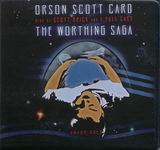
 The Worthing Saga
The Worthing Saga
By Orson Scott Card; Read by Scott Brick
Additional Readers: Emily Card, Harlan Ellison, Aaron Johnston, Eric Luke, Corinne Melançon, Stefan Rudnicki, and Orson Scott Card.
15 CD’s – 18 hours [UNABRIDGED]
Publisher: Blackstone Audio
ISBN: 0786181869
Themes: Science Fiction / Pain / Organization and Destruction / Telepathy / Space Travel
“If you try to eliminate the pain from your life, you destroy all hope of pleasure too.” This is from the character Stipock, and summarizes the main theme of the story. Like C.S. Lewis’ The Problem of Pain, Card’s work makes an interesting argument for the function of pain in our lives. Mr. Card effectively tears us from the safe, innocent comfort of Eden into an existence filled with overwhelming pain and genuine joy.
Like the author’s tales of Alvin Maker, this story explores tensions between forces that create and forces that destroy. It unfolds as a world previously spared suffering is allowed to experience pain and loss. Jason and Justice come to Flat Harbor for Lared, a boy who would write for them the story of how people had come to be spared suffering, and why that protection ended on the Day of Pain. It highlights the importance of human attachments and the destruction that comes from a society in which human relationships are sacrificed for more self-serving interests.
It had been a few years since I read the book in print, and I’d forgotten how good it is. The book is an interesting mix of stories, and like Hoom’s boats, Mr. Card fits them together “tight as a barrel”. It’s a gripping story, and after following the climax and denouement you realize, “wait, I’m only two-thirds of the way through the book!” The story of Jason and Lared ends there, but the book includes a number of stories of people living their lives in the worlds presented in The Worthing Saga. Even though the book is decades old, it could pass for being written this year. Technology advances but relationships and moral dilemmas are timeless, and both are Mr. Card’s stock in trade.
Scott Brick does a great job on the audio. I enjoyed his voice without being unduly distracted by it. Others read the later stories. None of them are unpleasant, and one of them added a great deal of personality to the story by sounding more like Jeff Foxworthy than Leonard Nimoy. Orson Scott Card himself read the introduction.